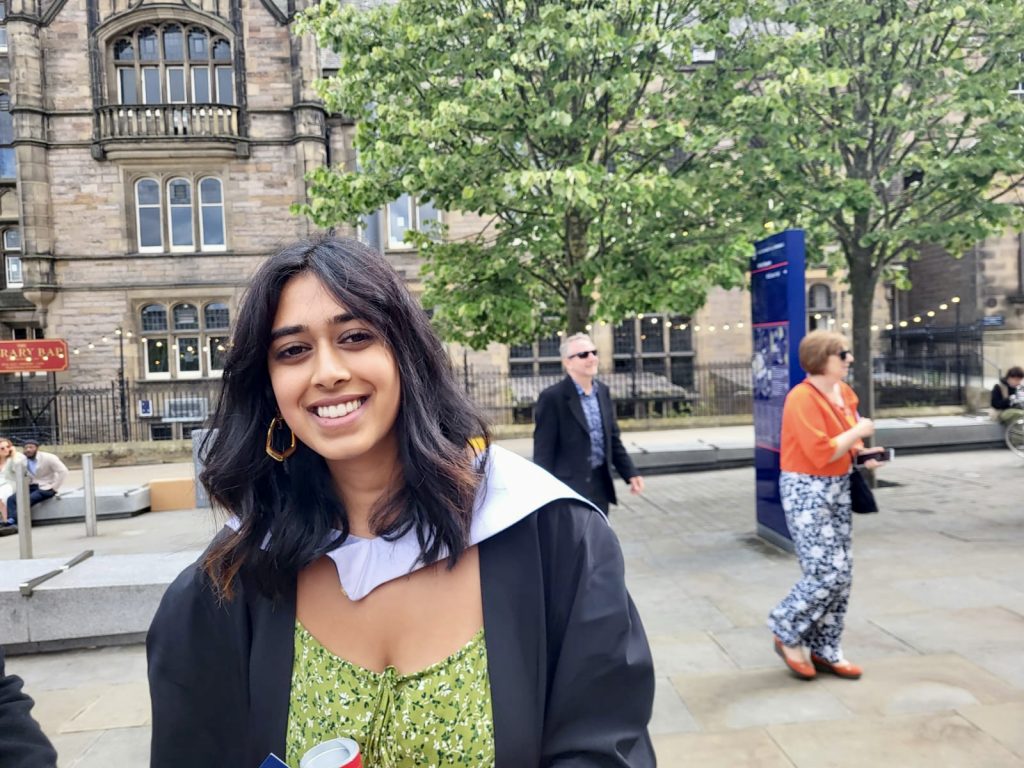The Digital Geographies Research Group is delighted to announce that this year’s winner of the UG Dissertation Prize is Shefali Sharma-Patel of the University of Edinburgh. Shefali’s thesis entitled ‘Resisting the Indian Smart City in times of COVID-19: Evaluating two civic technological projects’was highly commended by the judging panel how it combined urban governance, disease management and digital geographies.

Shefali’s dissertation examined the inequality, complexity and infrastructural shortcomings of India cities within the context of the Smart Cites Mission (SCM) and the COVID-19 pandemic. Through interviews and textual analysis Shefali anaysed how two digital NGOs – Praja Foundation and Noora Health – have shifted the development of urban areas in India by reproducing and subverting the SCM.
Using Simone’s (2018) concept of the ‘adaptive city’ – an alternative working of the Smart City that promotes the potential of ICT in increasing access to essential services – the study observed the importance of these NGOs in altering urban policy to benefit the urban majority. By exploring how these organisations have negotiated COVID-19, Shefali’s analysis highlights the importance of subversive uses of technology in the light of the growing technological control that has grown out of the pandemic.
Shefali’s dissertation also highlighted the importance of advocating for change within formal structures, as well as acknowledging the everyday informal practices of the urban majority that can be enhanced with subversive technology.
On receiving the award, Shefali’s said, “winning this prize came as a wonderful surprise! Having spent many, many hours in the library writing my dissertation, this prize has made me proud of the hard work I put in.
As someone of Indian heritage, I have always been interested in issues that face India. This dissertation allowed me to bridge my interests in urban spaces in India, the growing problematic use of surveillance and data, and grassroot resistance. The COVID-19 pandemic has highlighted and deepened the deficiencies and inequalities in Indian urban spaces, as well as providing opportunity for the growth of schemes such as the Indian Smart Cities Mission. Therefore, I have used my dissertation as an opportunity to explore alternative routes of urban development that come from NGOs which incorporate technology and data.
I am extremely grateful to have won this prize, and many thanks go to the DGRG for their recognition of my work. I would also like to thank the NGOs I interviewed during my research, Noora Health and Praja, for their work during challenging times and for giving up their time to provide me with great insights; my supervisor Pip Thornton for her help; and my friends and family, especially my parents, for their constant support throughout my life.
The digital is an important and emerging part of geography, and I hope to continue contributing to this exciting field in the future.”
Doug Specht, the outgoing DGRG prize coordinator, also added his congratulations, stating, “on behalf of everyone at the digital geographies research group, I want to say well done and many congratulations on this work. This is kind of work is extremely important and you have brought to the fore some contentious issues in such a way as to encourage critical engagement with these theme. I, and all at the DGRG, wish you the best with everything you go on to do”.
The Digital Geographies Research Group (DGRG) undergraduate dissertation prize recognises outstanding work in any area of digital geography. DGRG accepts entries from all European undergraduate degree programmes based upon original research that demonstrate a high degree of critical analysis and/or innovative and sophisticated methodologies.
The 2023 Prize will be open for entries from the spring. Follow us on Twitter or keep an eye on the Royal Geographical Society dissertation prize pages for further details.